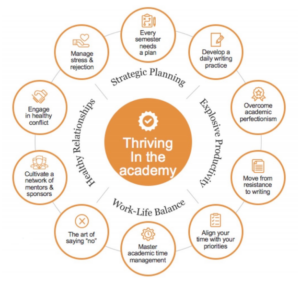Navigating the Path to Success: A Comprehensive Guide to the NCFDD Mentoring Map
Related Articles: Navigating the Path to Success: A Comprehensive Guide to the NCFDD Mentoring Map
Introduction
With enthusiasm, let’s navigate through the intriguing topic related to Navigating the Path to Success: A Comprehensive Guide to the NCFDD Mentoring Map. Let’s weave interesting information and offer fresh perspectives to the readers.
Table of Content
Navigating the Path to Success: A Comprehensive Guide to the NCFDD Mentoring Map

The National Center for Faculty Development & Diversity (NCFDD) offers a unique and valuable resource for faculty members at all stages of their careers: the Mentoring Map. This comprehensive tool provides a roadmap for navigating the complexities of academic life, fostering professional growth and success.
Understanding the NCFDD Mentoring Map: A Framework for Success
The NCFDD Mentoring Map is not a traditional, one-size-fits-all mentoring program. Instead, it functions as a framework, guiding faculty through a series of self-reflection exercises and personalized action steps. The map encourages individuals to identify their unique needs, goals, and challenges, and then develop a tailored plan for achieving them.
The Five Stages of the Mentoring Map
The Mentoring Map is structured around five distinct stages, each addressing a specific aspect of academic development:
1. Foundation: This initial stage focuses on building a strong foundation for success. It encourages faculty to reflect on their values, identify their strengths and weaknesses, and define their personal and professional goals. This stage also emphasizes the importance of self-care and establishing a healthy work-life balance.
2. Connection: The Connection stage emphasizes building meaningful relationships within the academic community. It encourages faculty to seek out mentors, peers, and colleagues who can offer support, guidance, and feedback. This stage also highlights the importance of networking and building collaborative relationships.
3. Navigation: The Navigation stage helps faculty navigate the complexities of academic life, including navigating tenure and promotion processes, securing research funding, and developing a sustainable research agenda. It provides strategies for effectively managing time, prioritizing tasks, and overcoming common challenges.
4. Impact: The Impact stage focuses on making a significant contribution to the field. It encourages faculty to develop their leadership skills, build their research portfolio, and engage in impactful scholarship. This stage also explores strategies for disseminating research findings and influencing policy.
5. Legacy: The Legacy stage encourages faculty to reflect on their career journey and consider how they can leave a lasting impact on the field. It encourages mentorship and sharing knowledge with future generations of scholars. This stage also emphasizes the importance of contributing to the broader academic community and promoting diversity and inclusion.
The Benefits of Utilizing the NCFDD Mentoring Map
The NCFDD Mentoring Map offers a range of benefits for faculty members, including:
- Increased Self-Awareness: The self-reflection exercises embedded within the map encourage individuals to gain a deeper understanding of their strengths, weaknesses, values, and goals.
- Personalized Growth Plan: The map provides a framework for developing a tailored plan for achieving personal and professional goals. This personalized approach ensures that individuals focus on the areas that are most relevant to their needs and aspirations.
- Enhanced Professional Development: The map offers a roadmap for navigating the complexities of academic life, providing strategies for addressing common challenges and achieving success.
- Stronger Relationships: The map emphasizes the importance of building meaningful relationships within the academic community, fostering a supportive network that can provide guidance and encouragement.
- Increased Impact: The map encourages faculty to develop their leadership skills, engage in impactful scholarship, and make a lasting contribution to their field.
FAQs Regarding the NCFDD Mentoring Map
1. Is the Mentoring Map suitable for all faculty members?
The NCFDD Mentoring Map is designed to be applicable to faculty members at all stages of their careers, from early-career faculty to senior professors. The map can be adapted to address the unique needs and challenges of individuals at different points in their professional journey.
2. How can I access the Mentoring Map?
The NCFDD Mentoring Map is available online through the NCFDD website. The map is free to access for all faculty members.
3. What are the key components of the Mentoring Map?
The Mentoring Map consists of five distinct stages, each addressing a specific aspect of academic development. These stages are: Foundation, Connection, Navigation, Impact, and Legacy.
4. How long does it take to complete the Mentoring Map?
The time required to complete the Mentoring Map will vary depending on individual needs and goals. However, the map is designed to be a flexible and adaptable tool that can be completed over time.
5. Are there any resources available to support my use of the Mentoring Map?
The NCFDD offers a range of resources to support faculty members in utilizing the Mentoring Map. These resources include online articles, webinars, and workshops.
Tips for Effectively Utilizing the NCFDD Mentoring Map
- Commit to Self-Reflection: Regularly engage in the self-reflection exercises provided within the map to gain a deeper understanding of your needs, goals, and challenges.
- Seek Out Mentors and Peers: Build a supportive network of mentors, colleagues, and peers who can offer guidance, feedback, and encouragement.
- Prioritize and Manage Time: Develop effective time management strategies to balance your academic responsibilities with personal commitments.
- Seek Support When Needed: Don’t hesitate to reach out for support when facing challenges or setbacks. The NCFDD and your academic community offer a range of resources to assist you.
- Celebrate Successes: Acknowledge and celebrate your achievements, both big and small, to maintain motivation and foster a sense of accomplishment.
Conclusion
The NCFDD Mentoring Map is a powerful tool for faculty members seeking to navigate the complexities of academic life and achieve professional success. By providing a framework for self-reflection, goal setting, and personalized action steps, the map empowers individuals to take ownership of their professional development and achieve their full potential. By embracing the principles and strategies outlined within the map, faculty members can cultivate a fulfilling and impactful academic career.








Closure
Thus, we hope this article has provided valuable insights into Navigating the Path to Success: A Comprehensive Guide to the NCFDD Mentoring Map. We hope you find this article informative and beneficial. See you in our next article!
